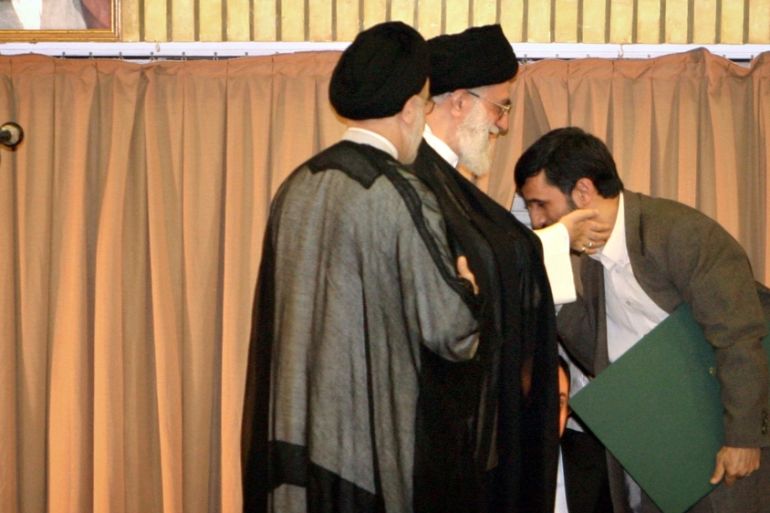Iran’s Ahmadinejad rules out another presidential bid
Two-term president and former Tehran mayor says he is bowing to the advice of Supreme Leader Ayatollah Ali Khamenei.

Iran’s controversial former president Mahmoud Ahmadinejad has said he is not running to reclaim his old post, following advice from the country’s supreme leader Ayatollah Ali Khamenei.
“You advised me it’s not expedient to run and I announced my obedience, following my explanations of my plans,” Ahmadinejad wrote in a letter to Khamenei made public by Iranian media on Tuesday.
Keep reading
list of 4 itemsWhy South Africa’s opposition may struggle to unseat the ruling ANC
Georgia police break up protests against ‘foreign agents’ bill
Indian spies linked to killings, tracking dissidents abroad: What we know
“I hereby inform you regarding the supreme leader’s considerations, I have no plan for next year’s elections.”
Ahmadinejad blamed for Iran’s fiscal woes
Ahmadinejad’s decision came a day after Khamenei, in cautiously worded remarks and without naming the ex-president, indicated that his standing again would be a mistake.
“A certain person came to me and I told him not to do a certain thing, believing it would be to the benefit of both the person himself and the country,” Khamenei had said.
He implied that an Ahmadinejad candidacy would have a polarising effect that would “damage the country”.
The Supreme Leader is seen as the final arbiter in the religious and political affairs in Iran.
Ahmadinejad, who was president between 2005 and 2013, said he had met Khamenei on August 30.
“I will forever remain the small soldier of the revolution and a servant of the people,” he concluded in his letter.
Ahmadinejad had made numerous public appearances in recent months, leading to speculation that he was planning a comeback in next May’s presidential election.
![Ahmadinejad made numerous public appearances in recent months, leading to speculation that he was planning a comeback in next May's presidential election [AP]](/wp-content/uploads/2016/09/f17827581b5f4f90bc78d8497cdf3e88_18.jpeg)
Boost for Rouhani
Afhmadinejad’s decision not run is likely to reassure moderate incumbent Hassan Rouhani, who is expected to stand for a second term in the May 19 vote.
Ahmadinejad left office in August 2013 after two turbulent four-year terms, leaving the Islamic republic divided domestically, isolated internationally and struggling economically.
In 2009, Ahmadinejad’s re-election was followed by one the largest protests to hit the country since the Islamic revolution three decades before.
Two candidates backed by reformists Mir Hossein Mousavi and Mehdi Karroubi – who have been under house arrest since February 2011 – contested the results.
Both of Ahmadinejad’s terms were also marked by anti-Western and anti-Israeli rhetoric, including questioning the Holocaust.
But Ahmadinejad’s populist approach and humble roots mean that he remains a popular figure among poorer sections of society.
|
|
Rouhani, who oversaw a deal with world powers to end sanctions in exchange for curbing Tehran’s nuclear programme, faces mounting pressure from conservatives who say the accord has brought few benefits.
Rouhani was elected on a promise to resolve the nuclear issue and normalise relations with the outside world.
The nuclear agreement was reached with the major powers in July 2015 after two years of intense negotiations.
But despite it coming into force in January 2016 and some international sanctions being lifted, the economy’s recovery is still pending.
Ahmadinejad’s withdrawal from the presidential race comes as another conservative, Mohsen Rezai, former head of the elite Revolutionary Guards, also announced Monday that he would not be a candidate next May.
More than eight months before the vote, political manoeuvring is already under way.
With Ahmadinejad out, the conservatives are trying to unite to support a single candidate to face Rouhani.
Tehran Mayor Mohammad Bagher Ghalibaf may also stand again, despite being a losing candidate twice, in 2005 and 2013.